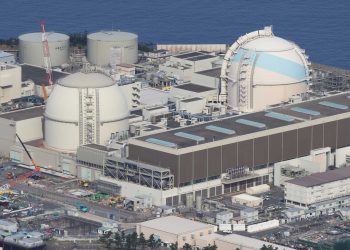Agence France-Presse,
Islamabad: Pakistan appears to be building a third plutonium nuclear reactor to significantly boost its production of atomic bombs, a US research group said Friday. Satellite images show work progressing rapidly at Khusab, 100 kilometres (60 miles) from Islamabad, where the other two reactors are sited, the Institute for Science and International Security (ISIS) said in a report.
Pakistan carried out its only nuclear tests in May 1998 after similar detonations by rival India, alarming the world. The Islamic republic is now a key ally in the US-led war on terror.
The construction work would “imply that Pakistan's government has made a decision to increase significantly its production of plutonium for nuclear weapons,” the institute said in its report.
“Almost all of the third reactor construction visible in the June 3, 2007 image has taken place in the last 10 months,” the Washington-based group added.
Pakistan's Foreign Office said the report was based on speculation.
“Off and on there are speculations of this nature. Pakistan has a nuclear weapons programme and Khusab is a declared nuclear site, that is not a new revelation,” spokeswoman Tasnim Aslam told AFP.
A Pakistani defence source told AFP that there was “an expansion programme in Khusab” but would not give any other details. Pakistan is fiercely protective of the security of its nuclear sites.
Another Pakistani government official defended Pakistan's right to a defensive atomic programme.
“The nuclear programme is a cornerstone of Pakistan's national defence strategy,” the official said on condition of anonymity.
The first reactor at Khusab began operations in 1998 while the institute reported that a second was being built in July 2006.
The third reactor is several hundred metres (yards) away from the second and appears to be a “replica”, although building work is progressing more quickly on the latest version, the ISIS said.
It reported earlier this year that Pakistan had resumed construction on its second plutonium separation facility at Chashma, around 80 kilometres away from Khusab.
It said this was “likely related” to Khusab's expansion.
The report said that neither the reactors nor the separation plant were safeguarded by the UN's nuclear watchdog, the International Atomic Energy Agency.
After three wars and decades of hostility, Pakistan and India launched a slow-moving peace process in 2004 which has led to the introduction of several bilateral nuclear safeguards.
The two countries, whose enmity focuses on the divided Himalayan territory of Kashmir, still regularly carry out test launches of nuclear-capable ballistic and cruise missiles.
Pakistan, the world's only known nuclear-armed Muslim country, remains at the heart of an investigation into an atomic black market headed by its disgraced chief nuclear scientist, Abdul Qadeer Khan.
Khan confessed in 2004 to passing atomic secrets to Iran, Libya and North Korea. He was pardoned by President Pervez Musharraf but remains under virtual house arrest in Islamabad.









